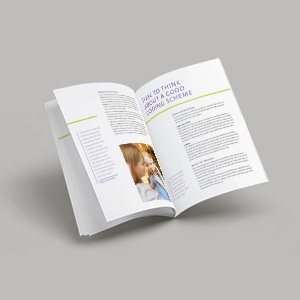Parenting behaviors and executive function in Down syndrome
Understanding more about developmental delays in Down syndrome is vital in developing targeted interventions. In this study, the relationship between parenting behaviors and executive function was examined.
Posted by
Published on
Tue 21 Jan. 2020

In the US, about one in every 700 babies is born with Down syndrome (DS). DS is a genetic disorder that is characterized by intellectual disability, as well as delays in different areas of development. In cognitive development, difficulties are most pronounced in attention, memory, and executive function.
Understanding more about these difficulties supports the development of targeted interventions for young children with DS.
Influences on executive function
Executive function (EF) describes the different abilities we need for goal-directed behavior. It includes processes such as working memory, inhibition, initiating behavior, and cognitive flexibility. Research has shown that, across the lifespan, EF is associated with academic and social skills, and daily functioning.
It is likely that individual differences in EF are influenced by both biological and environmental factors. For children, parents are one of the most important sources of influence. Indeed, studies with typically developing children have shown that parenting behaviors are associated with child EF performance.
For example, research has highlighted links between parent-child interactions and the development of brain regions responsible for EF. More specifically, researchers also found that maternal sensitivity and responsiveness are related to childhood EF.
But what kind of parenting behaviors are we talking about exactly?
Parenting behaviors
When a parent demands or requests a behavior change in their child, we describe this as directive parenting behavior. Directive parenting is often used in preschool aged children, to offer guidance for tasks they cannot complete independently. However, the overuse of directives may undermine the development of self-regulation skills, as it reduces the need for a child to problem-solve during a task.
On the other hand, parental teaching behaviors may stimulate the development of EF skills. Teaching behaviors include instructions or explanations, as well as questions that promote children’s learning. One particular form of teaching that benefits EF development is scaffolding. Scaffolding guides a child towards the correct solution, and includes methods such as giving hints or asking guided questions.
Parent-child interaction and Down syndrome
Parents of children with DS often use more directives than parents of typically developing children. This may benefit interactions between parents and children with DS, but may also impact certain aspects of EF. Parents of children with DS have also been found to use teaching behaviors, which seems to benefit EF development.
Researcher Emily Schworer and her collaborators at Colorado State University and Pennsylvania State University argue the importance of understanding more about the relationship between directive and teaching parenting behaviors and the development of EF in children with DS. They studied child EF abilities and observed parent-child interactions during a collaborative puzzle task.
They predicted that parents of children with DS would show more directive behaviors than parents of typically developing children, as well as an equal amount of teaching behaviors. They also predicted that children with DS would respond differently to parental directives when compared to a control group, while responding similarly to teaching behaviors.
Finally, the researchers hypothesized that the use of more directives would be associated with more impaired EF performance, while using more teaching behaviors would be linked to more advanced EF performance. They predicted these trends in both groups.
Observational study
The study included 42 children with DS between 5 and 10 years old and 28 typically developing children aged 2.5 to 4 years old. Although the two groups differed in chronological age, they were similar in nonverbal mental age.
Parents rated their children’s EF skills with a questionnaire and children completed an EF task that assessed working memory and inhibition. In this task, children were asked to perform a certain animal sound (activation), while not making the sound of another animal (inhibition). Finally, parents and children completed a challenge task together, in which they had to build three castle puzzles.
Parent-child interactions were videotaped and coded using The Observer XT. Coders observed directive and teaching behaviors in parents. Moreover, they coded whether children complied with their parents’ directive, continued their work without any parent behavior, or disengaged from the task.
Parent and child behaviors
Results of the study showed that parents of children with DS used more directives than parents of typically developing children, even when a child complied or continued with the task on his or her own. This highlights the tendency of parents to provide continued support during interactions. The frequency of teaching behaviors did not differ between groups.
Moreover, children with DS showed more compliant behaviors than children from the control group. However, further analysis indicated that this is likely a result of the greater number of parenting behaviors in this group, providing children with DS with more opportunities to comply with directives.
Patterns in parenting
Parent teaching behavior was associated with stronger working memory and inhibition skills, as reported by parents. This result was only found for DS dyads. Furthermore, increases in directive behaviors were associated with more impaired inhibitory control and working memory in the EF task. This association was found for both groups.
As the researchers note, it is important to realize that we cannot know the direction of these associations. Childhood EF may be influenced by parental directives or parents may use more directive behaviors because EF is impaired in their children. Similarly, teaching behaviors may affect EF performance in children. Another explanation is that parents use more teaching behaviors because their child has more advanced EF abilities.
Even so, the results from this study provide new insights in parent-child interaction in DS, and demonstrate that parenting behaviors can be a meaningful target for early interventions in this group.
References
Schworer, E.; Fidler, D.; Lunkenheimer, E.; Daunhauer, L. (2019). Parenting behavior and executive function in children with Down syndrome. Journal of Intellectual Disability Research, 63(4), 298-312.
https://www.cdc.gov/ncbddd/birthdefects/downsyndrome/data.html
https://en.wikipedia.org/wiki/Down_syndrome
Related Posts

Video-recording children with ASD in-home

Early infant behavior development of hand preference


